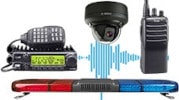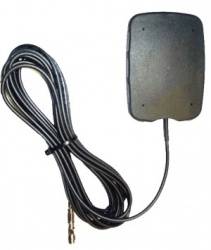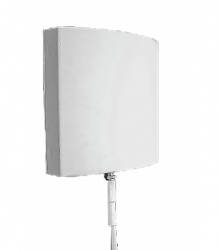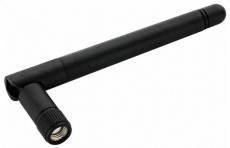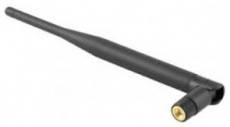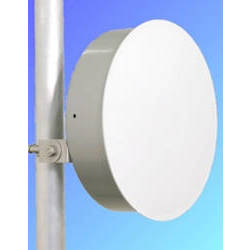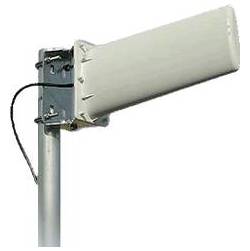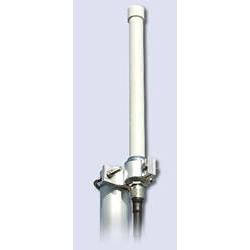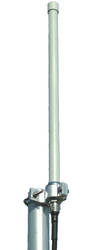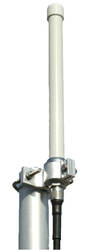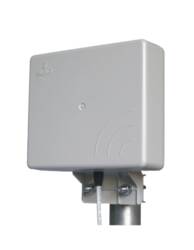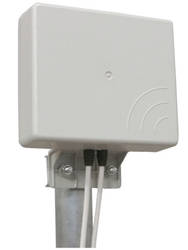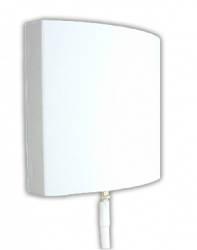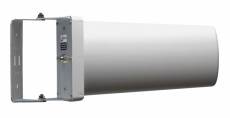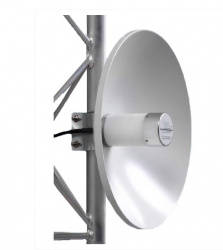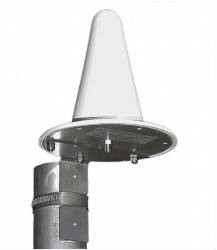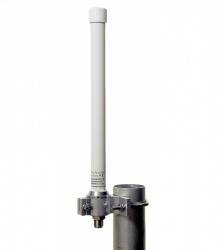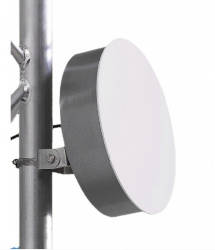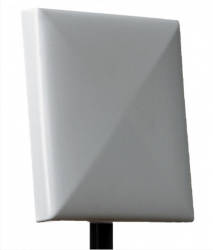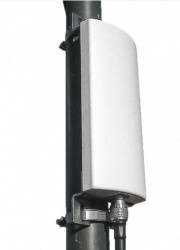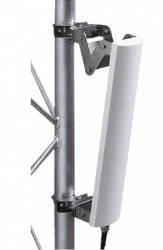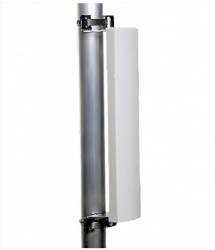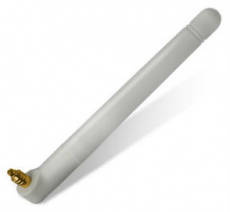WiFi Antennas
- further categoriesWifi antennas are offering longer range and better signal strength every year, and more and better quality accessories are becoming available to increase their performance or even to extend the network. Nowadays, continuous and fast internet access has become part of everyday life, often a basic requirement, and we can do a lot to achieve this by using the right wifi antennas and, where appropriate, accessories. Read more...
• Type: 1/2 λ dipole
• Frequency range: 800-960 MHz, 1710-5925 MHz
• Systems: GSM-R, GSM-900, GSM-1800, 2G-GSM/GPRS/EDGE, 3G-UMTS, 4G-LTE, ISM/SIGFOX/LoRa 868MHz, ISM/SIGFOX/LoRa 915MHz, WiFi-2.4GHz, WiFi-5GHz, WiMAX, V2X
• Impedance: 50Ω
• Radiation (H-plane): 360° omnidirectional
• Radiation (E-plane): 52° @ 2.4 GHz
• Polarization: linear vertical
• Gain: 0 dBd - 2.1 dBi
• Max. Power (CW) @ 30°C: 5-10 Watts (depending on the frequency range)
• Cable length / Type: 3 m / RG 174
• Connector: SMA-male
Special gross price: 18.99€ (Net price: 14.95€)
• Type: Cavity backed
• Frequency range: 2.4-2.485 GHz for WLAN system
• Impedance: 50Ω
• Radiation (H-plane): beamwidth @ -3 dB = 33°
• Radiation (E-plane): beamwidth @ -3 dB = 27°
• Radiation angle: Mechanical Bracket angle function
• Front to back ratio: ≥ 25 dB
• Polarization: vertical or horizontal
• Gain: 12.9 dBd - 15 dBi
• SWR in bandwidth: ≤ 1.6
• Max. power (CW) @ 30°C: 20 Watts
• Grounding protection: All metal part are DC-grounded, the inner conductor shows a DC-short
• Connector: SMA-female bulchead
Special gross price: 59.85€ (Net price: 47.13€)
• Type: Log periodic dipole array
• Frequency range: 1700-2500 MHz for DCS,PCS,DECT,UMTS and WLAN systems
• Impedance: 50Ω
• Radiation (H-plane): beamwidth @ -3 dB = 58° frequency independent
• Radiation (E-plane): beamwidth @ -3 dB = 46° frequency independent
• Radiation angle: 0°
• Front to back ratio: ≥ 24 dB
• Polarization: linear vertical
• Gain: 9 dBd - 11.1 dBi
• SWR in bandwidth: ≤ 2
• Max. power (CW) @ 30°C: 50 Watts
• Grounding protection: All metal part are DC-grounded, the inner conductor shows a DC-short
• Connector: SMA-female bulkhead
• Type: 3x1/2λ colinear dipole array
• Frequency range: 2.3-2.5 GHz for WLAN system
• Impedance: 50Ω
• Radiation (H-plane): 360° omnidirectional
• Radiation (E-plane): beamwidth @ -3 dB = 22°
• Radiation angle: 0°
• Polarization: linear vertical
• Gain: 3.9 dBd - 6 dBi
• SWR in bandwidth: ≤ 1.5
• Max. power (CW) @ 30°C: 20 Watts
• Grounding protection: All metal part are DC-grounded, the inner conductor shows a DC-short
• Connector: N-female
• Type: 7x1/2λ colinear dipole array
• Frequency range: 2.4-2.485 GHz for WLAN system
• Impedance: 50Ω
• Radiation (H-plane): 360° omnidirectional
• Radiation (E-plane): beamwidth @ -3 dB = 10°
• Radiation angle: 0°
• Polarization: linear vertical
• Gain: 6.9 dBd - 9 dBi
• SWR in bandwidth: ≤ 1.5
• Max. power (CW) @ 30°C: 20 Watts
• Grounding protection: All metal part are DC-grounded, the inner conductor shows a DC-short
• Connector: N-female
• Type: colinear dipole array, omnidirectional
• Frequency range: 2400-2485 Mhz & 5150-5875 Mhz
• Impedance: 50Ω
• Radiation (H-plane): 360° omnidirectional
• Radiation (E-plane): beamwidth @ -3 dB = 30° @ 2442,5 MHz; 20° @ 5512,5 MHz
• Radiation angle: 0°
• Polarization: linear vertical
• Gain: 4 dBi for 2400-2485 MHz, 6 dBi for 5150-5875 MHz
• Max. power (CW) @ 30°C: 10 Watts
• Grounding protection: All metal part are DC-grounded, the inner conductor shows an open circuit
• Connector: N-female
• Type: Mini panel antenna
• Frequency range: 2.3-2.7 GHz & 3.3-3.8 GHz for WiMAX 2.3-2.7, WiMAX 3.3-3.8 and WLan 2.4 systems
• Impedance: 50Ω
• Radiation (H-plane): beamwidth @ -3 dB = 35° @ 2.5GHz; 28° @ 3.55GHz
• Radiation (E-plane): beamwidth @ -3 dB = 60° @ 2.5GHz; 37° @ 3.55GHz
• Radiation angle: 0°
• Front to back ratio: ≥ 15 dB @ 2.3-2.7 GHz; ≥ 20 dB @ 3.3-3.8 GHz
• Polarization: linear vertical
• Gain: 10 dBi @ 2.3-2.7 GHz; 13 dBi @ 3.3-3.8 GHz
• SWR in bandwidth: ≤ 1.8
• Max. power (CW) @ 30°C: 6 Watts
• Cable lenght / type: White Low Loss / 30 cm
• Connector: SMA-male
Special gross price: 64.88€ (Net price: 51.08€)
• Type: Directional mini panel - 2 wideband elements
• Frequency range: 2.4-2.5 GHz & 5.15-5.89 GHz
• Impedance: 50Ω
• Polarization: cross
• Systems: WiFi-2.4GHz, WiFi-5GHz
• Radiation (H-plane/E-plane: see diagrams in pdf
• Front to back ratio: ≥ 15 dB @ 2.4-2.5 GHz; ≥ 20 dB @ 5.15-5.89 GHz
• Gain: 7 dBi @ 2.4-2.5 GHz; 11.4 dBi @ 5.15-5.89 GHz
• SWR in bandwidth: ≤ 2
• Max. power (CW) @ 30°C: 20 Watts @ 2.4-2.5 GHz; 8 Watts @ 5.15-5.89 GHz
• Cable lenght / type: 2x white low loss / 30 cm
• Connector: 2x SMA-male
• Type: directional indoor
• Frequency range: 2400-2485 MHz
• Impedance: 50Ω
• Radiation angle: horizontal: 65°, vertical: 65°
• Polarisation: vertical
• Gain: 9 dBi
• VSWR: < 1,5:1
• Maximum input power: 20 Watts
• Type: directional indoor
• Frequency range: 5470-5875 MHz
• Impedance: 50Ω
• Radiation angle: horizontal: 50°, vertical: 30°
• Polarisation: vertical
• Gain: 12 dBi
• VSWR: < 1,5:1
• Maximum input power: 20 Watts
• Type: yagi
• Frequency range: 2300-2700 MHz
• Impedance: 50Ω
• Polarisation: vertical
• Gain: 11 dBi
• VSWR: < 1,4:1
• Maximum input power: 10 Watts
• Type: parabolic
• Frequency range: 5470-5875 MHz
• Impedance: 50Ω
• Radiation angle: 9°
• Polarisation: linear (mounting in 45° steps)
• Gain: 25 dBi
• VSWR: < 1,7:1
• Maximum input power: 20 Watts
• Type: omnidirectional
• Frequency range: 2400-2485 MHz
• Impedance: 50Ω
• Polarisation: vertical
• Gain: 5 dBi
• VSWR: < 1,5:1
• Maximum input power: 20 Watts
• Type: omnidirectional
• Frequency range: 2400-2485 MHz
• Impedance: 50Ω
• Polarisation: vertical
• Gain: 6 dBi
• VSWR: < 1,5:1
• Maximum input power: 20 Watts
• Type: omni
• Frequency range: 5470-5875 MHz
• Impedance: 50Ω
• Polarisation: vertical
• Gain: 9 dBi
• VSWR: < 1,5:1
• Maximum input power: 20 Watts
• Type: directional
• Frequency range: 2400-2485 MHz
• Impedance: 50Ω
• Radiation angle: H-plane: 22°, E-plane: 30°
• Polarisation: linear
• Gain: 14 dBi
• VSWR: < 1,5:1
• Maximum input power: 20 Watts
• Type: directional
• Frequency range: 5470-5875 MHz
• Impedance: 50Ω
• Radiation angle: horizontal: 20°, vertical: 20°
• Polarisation: horizontal / vertical
• Gain: 18 dBi
• VSWR: < 1,7:1
• Maximum input power: 20 Watts
• Type: sector radiant
• Frequency range: 2400-2485 MHz
• Impedance: 50Ω
• Radiation angle: azimuth: 70°, elevation 27°
• Polarisation: vertical
• Gain: 12 dBi
• VSWR: < 1,5:1
• Maximum input power: 20 Watts
• Type: sector radiant
• Frequency range: 2400-2485 MHz
• Impedance: 50Ω
• Radiation angle: azimuth: 70°, elevation 15°
• Polarisation: vertical
• Gain: 14 dBi
• VSWR: < 1,5:1
• Maximum input power: 20 Watts
• Type: sector radiant
• Frequency range: 5470-5875 MHz
• Impedance: 50Ω
• Radiation angle: azimuth: 60°, elevation 10°
• Polarisation: vertical
• Gain: 16 dBi
• VSWR: < 1,7:1
• Maximum input power: 20 Watts
• Type: sector radiant
• Frequency range: 5470-5875 MHz
• Impedance: 50Ω
• Radiation angle: azimuth: 90°, elevation 10°
• Polarisation: vertical
• Gain: 14,5 dBi
• VSWR: < 1,7:1
• Maximum input power: 20 Watts
• Type: sector radiant
• Frequency range: 5470-5875 MHz
• Impedance: 50Ω
• Radiation angle: azimuth: 120°, elevation 10°
• Polarisation: vertical
• Gain: 13 dBi
• VSWR: < 1,7:1
• Maximum input power: 20 Watts
• Type: omnidirectional
• Frequency: 2.4 GHz
• Impedance: 50 Ω
• MIMO, SISO: 1 x 1
• Azimuth beam width (-6dB) [°]: 360, 13
• Gain: 2 dBi
• Connector: RPSMA male
• For indoor use
• Material: UV stabilized plastic
• Color: black
• Dimensions: 120x8x8 mm
• Type: omnidirectional
• Frequency: 2.4 + 5 GHz (Dual Band)
• Impedance: 50 Ω
• MIMO, SISO: 1 x 1
• Azimuth beam width (-6dB) [°]: 360, 13
• VSWR: <1,9
• Gain: 5 dBi
• Connector: RPSMA male
• For indoor use
• Material: UV stabilized plastic
• Color: black
• Dimensions: 198x12x12 mm
• Type: omnidirectional
• Frequency: 2.4 GHz
• Impedance: 50 Ω
• MIMO, SISO: 1 x 1
• Azimuth beam width (-6dB) [°]: 360, 13
• VSWR: <1,5
• Gain: 2 dBi
• Connector: MMCX
• For indoor use
• Material: UV stabilized plastic
• Color: white
• Dimensions: 94x8x8 mm
What types of wifi antennas exist today?
First, let's take a brief look at what we mean by directional and omnidirectional wifi antennas, as well as active and passive devices.
Directional and omnidirectional wifi antennas
The two basic types of wifi antennas are directional and omnidirectional. An omnidirectional wifi antenna sends and receives signals in a 360 degree direction during operation, while a directional one is always concentrated towards a specific point. Think of it like the difference between a light bulb and a flashlight: the former emits light in all directions, while the latter only emits light towards one point. If you need to transmit the signal over a greater distance and need to transmit a connection between a known fixed point, a directional wifi antenna may be a suitable choice.
As signal strength improves, it can be used to achieve ever greater range. Generally speaking, the narrower the area where the signal is concentrated, the greater the range. An omnidirectional wifi antenna, on the other hand, can be useful for sending and receiving from all directions, for example to create a hotspot.
Active and passive wifi antennas
Another approach to wifi antennas is to talk about passive and active devices. Passive wifi is an energy-saving and efficient solution that is still relatively new. In essence, the devices connected to it remain passive, communicating with the transmitting unit without a radio frequency component. All in all, passive wifi antennas use three to four times less energy to operate than active versions, but often offer a longer range, sometimes hundreds of metres, compared to them.
Worth investing in a serious wifi antenna!
A good quality wifi antenna can be useful even in a household, for example if you want to make the most of the bandwidth offered by your service provider. A fast and reliable long-range connection between your devices and the router. In particular, passive Wi-Fi offers better performance than ever before, making it a great choice when you need to set up a wireless network in an office, warehouse or even a factory.
A wide range of wifi antennas and accessories await you at the DND webshop!
In the DND Telecom online shop you will find all the equipment and accessories you need to build a stable, reliable and high-performance network. In the wifi antenna category, you can choose from a selection of mainly passive devices and their often useful signal amplifiers. We also have everything you need to set up an industrial or household network, from 2.4 GHz or 5 GHz outdoor and indoor wifi antennas to cables, connectors, extension cables, cable converters and antenna mounting brackets.
Our 2.4Ghz and 5Ghz antenna range includes Sirio, Diamond, Maxlink, PC Engines and Carant antennas. Types include directional and sector antennas, omnidirectional antennas, and desktop magnet mount antennas. Some antenna types cover some GSM bands (3G, 4G, LTE) in addition to the 2.4Ghz and 5Ghz bandwidths, so they can also be used for these purposes. Our products also include small omnidirectional wifi stick antennas for use on wifi devices.
What is the range of the wifi antenna?
The range of home wifi antennas for indoor use is usually between 20 and 50 meters. But it depends a lot on the properties of the antenna. In addition to omnidirectional wifi antennas, there are also sectored models with adjustable beam angles. In this way, the signal can be largely directed in the desired direction, thus increasing the range of the antenna. This is useful if the desired coverage area is in the same direction as the antenna. But you can also choose a wifi antenna that is designed to cover an outdoor area, for example if you want to have wifi reception in your garden.
In this case, you should choose a special outdoor wifi antenna with a longer range. These flat wifi antennas can also be mounted on a satellite wall mount. Their gain can reach up to 9-11 dBi. For special purposes, choose directional wifi antennas that can cover long distances, with a signal range of up to 50 km.
What kind of connector does the wifi antenna have?
Most wifi routers and antennas have what is called an RP-SMA connector. But sometimes you may have an R-SMA plug. So first make sure what kind of socket your wifi antenna connector has. For small, portable routers, make sure you probably have to use a TS-9 connector. Some special antennas, especially for industrial use, have special plugs. In this case, don't be alarmed either, as there are various adapters available for almost all connectors.
Is the wifi antenna compatible with existing devices?
Because the antenna and the device use connectors that are made to different standards, they can be used with a wide range of devices. Let's first look at where we want to place the antenna and what kind of connector it has, and we've narrowed down the range of wifi antennas that are suitable to connect to our devices without any problems.
Do you need to set up a wifi antenna?
Setting up a wifi antenna requires some practice. In each case, we need to check which objects or masonry may affect signal transmission. In this case, we need to find out which location is the most suitable, but we can also ask for help over the phone. This can be in the form of an app. An analysis software can be of great help in this case. Let's save an app on our phone that we like and that helps us with everything. For example, wiring in a wall can affect this, or a mirror, because it has a metallic coating on it, so it's an excellent shade. When you have found the right place, you also need to pay attention to the angle of the antenna, because the signals you want to transmit are emitted perpendicular to the antenna. Therefore, it makes a difference which direction the signal propagation is strong. Vertically or horizontally. If you can, place the antenna in the centre of the area you want to cover, and place as few metal objects as possible near the wifi antenna.
What environmental conditions is the wifi antenna compatible with?
The best wifi antenna, whether 2.4 GHz or 5 GHz, will not provide a good internet connection if there are many obstacles between it and the device that affect the signal. Make sure there are as few obstacles as possible in the band where you want the signal to reach. If possible, do not place the antenna in a cabinet or where it might be blocked by walls. If this is not possible, use a wifi signal booster.
If you need to create a custom cable or install an outdoor antenna to create your network, please contact the experts at DND Telecom webshop and they will be happy to help you!

